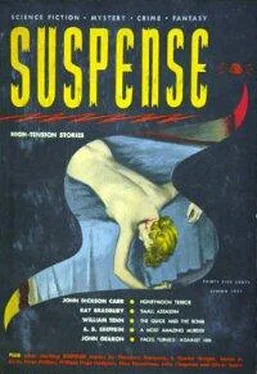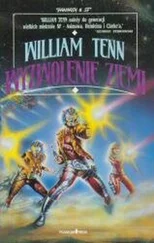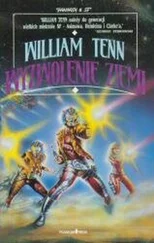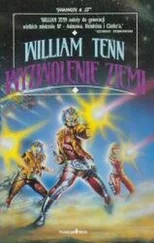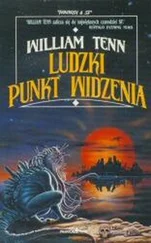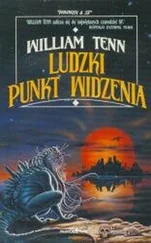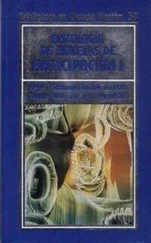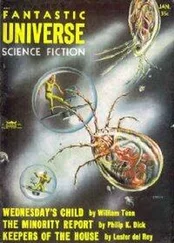William Tenn - Generation of Noah
Здесь есть возможность читать онлайн «William Tenn - Generation of Noah» весь текст электронной книги совершенно бесплатно (целиком полную версию без сокращений). В некоторых случаях можно слушать аудио, скачать через торрент в формате fb2 и присутствует краткое содержание. Жанр: Фантастика и фэнтези, на английском языке. Описание произведения, (предисловие) а так же отзывы посетителей доступны на портале библиотеки ЛибКат.
- Название:Generation of Noah
- Автор:
- Жанр:
- Год:неизвестен
- ISBN:нет данных
- Рейтинг книги:3 / 5. Голосов: 1
-
Избранное:Добавить в избранное
- Отзывы:
-
Ваша оценка:
- 60
- 1
- 2
- 3
- 4
- 5
Generation of Noah: краткое содержание, описание и аннотация
Предлагаем к чтению аннотацию, описание, краткое содержание или предисловие (зависит от того, что написал сам автор книги «Generation of Noah»). Если вы не нашли необходимую информацию о книге — напишите в комментариях, мы постараемся отыскать её.
.
Generation of Noah — читать онлайн бесплатно полную книгу (весь текст) целиком
Ниже представлен текст книги, разбитый по страницам. Система сохранения места последней прочитанной страницы, позволяет с удобством читать онлайн бесплатно книгу «Generation of Noah», без необходимости каждый раз заново искать на чём Вы остановились. Поставьте закладку, и сможете в любой момент перейти на страницу, на которой закончили чтение.
Интервал:
Закладка:
Generation of Noah
by William Tenn
That was the day Plunkett heard his wife screaming guardedly to their youngest boy.
He let the door of the laying house slam behind him, forgetful of the nervously feeding hens. She had, he realized, cupped her hands over her mouth so that only the boy would hear.
“Saul! You, Saul! Come back, come right back this instant. Do you want your father to catch you out there on the road? Saul!”
The last shriek was higher and clearer, as if she had despaired of attracting the boy's attention without at the same time warning the man.
Poor Ann!
Gently, rapidly, Plunkett shh'd his way through the bustling and hungry hens to the side door. He came out facing the brooder run and broke into a heavy, unathletic trot.
He heard the other children clatter out of the feed house. Good! They have the responsibility after Ann and me, Plunkett told himself. Let them watch and learn again.
“Saul!” his wife's voice shrilled unhappily. “Saul, your father's coming!”
Ann came out of the front door and paused. “Elliot,” she called at his back as he leaped over the flush well-cover. “Please, I don't feel well.”
A difficult pregnancy, of course, and in her sixth month. But that had nothing to do with Saul. Saul knew better.
At the last frozen furrow of the truck garden Plunkett gave himself a moment to gather the necessary air for his lungs. Years ago, when Von Rundstedt's Tigers roared through the Bulge, he would have been able to dig a foxhole after such a run. Now, he was badly winded. Just showed you: such a short distance from the far end of the middle chicken house to the far end of the vegetable garden—merely crossing four acres—and he was winded. And consider the practice he'd had.
He could just about see the boy idly lifting a stick to throw for the dog's pleasure. Saul was in the further ditch, well past the white line his father had painted across the road.
“Elliot,” his wife began again. “He's only six years old. He—”
Plunkett drew his jaws apart and let breath out in a bellyful of sound. “Saul! Saul Plunkett!” he bellowed. “Start running!”
He knew his voice had carried. He clicked the button on his stopwatch and threw his right arm up, pumping his clenched fist.
The boy had heard the yell. He turned, and, at the sight of the moving arm that meant the stopwatch had started, he dropped the stick. But, for the fearful moment, he was too startled to move.
Eight seconds. He lifted his lids slightly. Saul had begun to run. But he hadn't picked up speed, and Rusty skipping playfully between his legs threw him off his stride.
Ann had crossed the garden laboriously and stood at his side, alternately staring over his jutting elbow at the watch and smiling hesitantly sidewise at his face. She shouldn't have come out in her thin housedress in November. But it was good for Ann, too. Plunkett kept his eyes stolidly on the unemotional second hand.
One minute forty.
He could hear the dog's joyful barks coming closer, but as yet there was no echo of sneakers slapping the highway. Two minutes. He wouldn't make it.
The old bitter thoughts came crowding back to Plunkett. A father timing his six-year-old son's speed with the best watch he could afford. This, then, was the scientific way to raise children in Earth's most enlightened era. Well, it was scientific…in keeping with the latest discoveries…
Two and a half minutes. Rusty's barks didn't sound so very far off. Plunkett could hear the desperate pad-pad-pad of the boy's feet. He might make it at that. If only he could!
“Hurry, Saul,” his mother breathed. “You can make it.”
Plunkett looked up in time to see his son pound past, his jeans already darkened with perspiration. “Why doesn't he breathe like I told him?” he muttered. “He'll be out of breath in no time.”
Halfway to the house, a furrow caught at Saul's toes. As he sprawled, Ann gasped. “You can't count that, Elliot. He tripped.”
“Of course he tripped. He should count on tripping.”
“Get up, Saulie,” Herbie, his older brother, screamed from the garage where he stood with Josephine Dawkins, one pail of eggs between them. “Get up and run! This corner here! You can make it!”
The boy heaved to his feet, and threw his body forward again. Plunkett could hear him sobbing. He reached the cellar steps—and literally plunged down.
Plunkett pressed the stopwatch and the second hand halted. Three minutes thirteen seconds.
He held the watch up for his wife to see. “Thirteen seconds, Ann.”
Her face wrinkled.
He walked to the house. Saul crawled back up the steps, fragments of unrecovered breath rattling in his chest. He kept his eyes on his father.
“Come here, Saul. Come right here. Look at the watch. Now, what do you see?”
The boy stared intently at the watch. His lips began twisting; startled tears writhed down his stained face. “More—more than three m-minutes, poppa?”
“More than three minutes, Saul. Now, Saul—don't cry, son; it isn't any use—Saul, what would have happened when you got to the steps?”
A small voice, pitifully trying to cover its cracks: “The big doors would be shut.”
“The big doors would be shut. You would be locked outside. Then—what would have happened to you? Stop crying. Answer me!”
“Then, when the bombs fell, I'd—I'd have no place to hide. I'd burn like the head of a match. An'—an' the only thing left of me would be a dark spot on the ground, shaped like my shadow. An'—an'—”
“And the radioactive dust,” his father helped with the catechism.
“Elliot—” Ann sobbed behind him. “I don't—”
“Please, Ann! And the radioactive dust, son?”
“An' if it was ra-di-o-ac-tive dust 'stead of atom bombs, my skin would come right off my body, an' my lungs would burn up inside me—please, poppa, I won't do it again!”
“And your eyes? What would happen to your eyes?”
A chubby brown fist dug into one of the eyes. “An' my eyes would fall out, an' my teeth would fall out, and I'd feel such terrible terrible pain—”
“All over and inside you. That's what would happen if you got to the cellar too late when the alarm went off, if you got locked out. At the end of three minutes, we pull the levers, and no matter who's outside— no matter who —all four corner doors swing shut and the cellar will be sealed. You understand that, Saul?”
The two Dawkins children were listening with white faces and dry lips. Their parents had brought them from the city and begged Elliot Plunkett, as he remembered old friends, to give their children the same protection as his. Well, they were getting it. This was the way to get it.
“Yes, I understand it, poppa. I won't ever do it again. Never again.”
“I hope you won't. Now start for the barn, Saul. Go ahead.” Plunkett slid his heavy leather belt from its loops.
“Elliot! Don't you think he understands the horrible thing? A beating won't make it any clearer.”
He paused behind the weeping boy trudging to the barn. “It won't make it any clearer, but it will teach him the lesson another way. All seven of us are going to be in that cellar three minutes after the alarm, if I have to wear this strap clear down to the buckle!”
When Plunkett later clumped into the kitchen with his heavy farm boots, he stopped and sighed.
Ann was feeding Dinah. With her eyes on the baby, she asked, “No supper for him, Elliot?”
“No supper.” He sighed again. “It does take it out of a man.”
“Especially you. Not many men would become a farmer at thirty-five. Not many men would sink every last penny into an underground fort and powerhouse, just for insurance. But you're right.”
Читать дальшеИнтервал:
Закладка:
Похожие книги на «Generation of Noah»
Представляем Вашему вниманию похожие книги на «Generation of Noah» списком для выбора. Мы отобрали схожую по названию и смыслу литературу в надежде предоставить читателям больше вариантов отыскать новые, интересные, ещё непрочитанные произведения.
Обсуждение, отзывы о книге «Generation of Noah» и просто собственные мнения читателей. Оставьте ваши комментарии, напишите, что Вы думаете о произведении, его смысле или главных героях. Укажите что конкретно понравилось, а что нет, и почему Вы так считаете.
